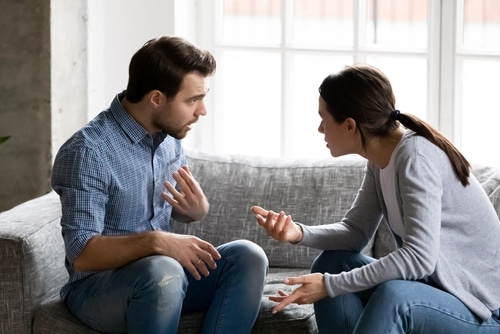Most untreated injuries, both physical and emotional ones, either keep getting worse until we’re forced to do something about them or leave scars and damage we learn we learn to live with. Unlike physical scars, emotional and psychological ones are not as obvious. Some people might feel a vague sense that something’s wrong, while others simply accept them as a part of life. However, the effects of trauma can make our lives and relationships with other people significantly harder than they need to be.
The scars and wounds of unresolved trauma can leave us with a distorted sense of self and the people around us. They act as a filter through which we observe the world, preventing us from seeing it objectively and showing us only the bad and the scary. When we bring this type of mindset into a relationship, when we’re scared and always expecting the worst, we incorrectly attribute bad intentions to people and instinctively react to protect ourselves. Unfortunately, these reactions are often led by fear, anger, or other negative emotions.
However, trauma response is not always easy to recognize. While initial reactions to acute trauma can be overwhelming and hard to miss (fight, flight, freeze, fawn response), people with lasting unresolved trauma frequently try to bury hurtful emotions and repress painful memories. As a result, they often manifest as depression, anxiety, low self-esteem, and addictive or high-risk behaviors, leading to an inability to connect with others and form healthy, meaningful relationships. The causes of trauma can be different, but many symptoms and effects are quite similar.
Can Unresolved Traumas Impact Your Relationship?
People who never uncover the trauma they experienced, or alternatively, never address it, usually develop defense mechanisms to protect themselves from reexperiencing it and feeling the same pain and suffering. Unfortunately, some people’s coping mechanisms can be particularly unhealthy or ‘maladaptive’ and cause significant difficulties that prevent them from forming or maintaining healthy relationships with others. All types of relationships can get affected: the ones with friends, family, children, or romantic partners.
The main reason behind this is usually a distorted sense of self. When we don’t feel good about ourselves, have low self-esteem, and feel unworthy of attention and love, it’s easy to presume that others see us that way too. This is far from the truth. This phenomenon can be compared to twisted images of carnival mirrors that we used to find funny as children. In other words, we become unable to see ourselves objectively and recognize that others don’t see the exact same thing we see.
From where they’re standing, they could see a different distorted version without being aware of the underlying causes of your behavior, reactions, and hurt. Not expressing your fears and worries and channeling them through harmful behavior patterns can make it impossible for others to reach through to you and provide the support you need. Or they’ve been trying to do it for a long time, but the lens you’re looking through prevents you from recognizing genuine affection and love.

How Does Unresolved Trauma Impact Relationships?
All the negative events and experiences we were exposed to during childhood or as adults leave their mark on our sense of self and others. The behaviors we adopt to protect ourselves, adapt, and survive strongly influence our ability to form and maintain healthy, loving relationships. Early childhood trauma usually shapes our attachment style and sense of self-worth. But even when we experience acute trauma later in life, as adults, it can still make us feel unsafe, anxious, and mistrustful while still feeling the vital need for the comfort of a loving, healthy relationship.
This creates a specific type of ambivalent behavior that may seem very confusing to romantic partners. People with unresolved trauma can often exhibit some unhealthy behaviors that could complicate even minor issues and disagreements:
- Fear of being alone.
- Fear of abandonment.
- Difficulty trusting people.
- Controlling behavior.
- Bullying.
- Perfectionism.
- Constant fear or even panic.
- Isolating from others and pushing people away.
- Fear of change and anything new.
- Indecisiveness.
- Codependent relationships and attachment styles.
- Excessive people-pleasing.
- Needing validation from others.
- No healthy boundaries
- Self-deprecation.
People who experienced some type of acute trauma often suffer from one or more behavioral and mental health issues that prevent them from forming close connections with other people. Some of the most common emotional and mental health hardships that stand in the way of healthy relationships and attachment styles include:
- Adjustment disorders
- Acute stress disorder
- PTSD
- Mental health conditions
- Phobias
- Substance abuse
- Depression
- Anxiety
- Obsessive or compulsive behavior.

How Do You Prevent Traumas From Affecting Your Relationship?
Even when people are aware of the underlying causes of their relationship difficulties, simply knowing what the problem may be is usually not enough. Aside from being identified, trauma-related issues need to be thoroughly addressed. This might, depending on their severity, require expert guidance and support.
The first step to overcoming trauma is understanding what it is and learning about its effects. This will help you accept the fact that your issues are fixable and give you the incentive to:
- Uncover your trauma. Share it with people you trust or a professional if you feel you can’t confide in people in your life or they wouldn’t understand what you’re going through.
- Practice awareness and mindfulness. Notice what triggers negative emotions, identify them, name them, and allow yourself to feel them. Resist the urge to push them down or distract yourself away from what you’re feeling.
- Rely on your own strength and self-care for comfort. Think about the things that make you feel good about yourself and use them to lift yourself up in tricky situations.
- Notice your progress. Keeping a journal might help you get a new perspective on painful experiences and the ways you’ve been dealing with them before.
- Remember that it’s not a race. Take the time you need, and don’t get discouraged if you feel that you’re not progressing as fast as you’ve hoped. You can slow down if it gets hard and pick up where you left off when you feel ready again.
Going through the journey of your trauma may feel long and painful, but the benefits of persisting are numerous and will help you improve your well-being and relationship dynamics. You will learn to:
- Protect yourself when necessary.
- Create boundaries.
- Become assertive.
- Find courage.
- Accurately assess danger and avoid or leave high-risk situations, including unhealthy relationships.
- Be present in the moment and your life.
- Have Compassion for yourself and others.
- Compromise.
- Listen more actively.
Learn Healthier Ways To Manage Your Trauma Response And Improve Your Relationships
By practicing more constructive thought and behavior patterns, you can unlearn harmful coping mechanisms that may have made you feel isolated, misunderstood, and unseen. PIVOT’s relationship advocates can guide you through identifying your feelings, sharing them, and connecting with others within healthy boundaries.
If you feel isolated and alone, you can address your emotions in a safe environment of a small group workshop with people with similar issues in Glass House workshops led by our experienced coaches.
